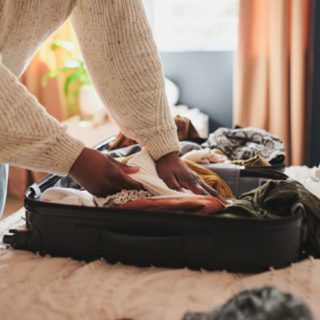Every week, Zikoko will share the hustle stories of Nigerians making it big in and out of the country. With each story, we’ll ask one crucial question in several ways: “How you do am?”
Sola Ajao is a 59 -year-old Nigerian woman based in Boston, US. She started cooking at 10 and grew to love it. But when she moved to the States to get married, she realised there was a gap in accessing African foods. She’s spent 20 years building a business to bridge the gap and tells us how she’s done it.
Do you have any formal training as a chef?
No, but cooking has always been a part of my life. I started cooking for my family when I was ten years old. We didn’t have a maid, and I had two younger siblings, so my mum taught me to take care of the family while she was away at work. It made me grow to love food.
How did you move from being a ten-year-old learning to cook to growing a business?
When I was 26, I moved to Boston, Massachusetts to marry my husband. I was living in a different country for the first time, and I could never find familiar ingredients to cook my meals.
Whenever I wanted to make something as simple as jollof rice, I’d drive 215 miles to New York for the spices. It didn’t take long to notice the gap, so I decided to buy African spices and foodstuff from New York to start a food business in my Boston home.
Interesting. So there was no competition in Boston at the time?
None that I knew of. New York, on the other hand, was a much bigger hub. When Africans came to the states in the 80s, they usually landed in New York — that’s what most people referred to as Yankee.
As a result of the influx of Africans in New York, they had the infrastructure for importing African food. So I’d place my orders through vendors in New York who had importing licenses.
How were you able to build a network in a new country?
When I started, I was pretty much taking a leap of faith. I put all my savings into the business. I tried to get other sources of funding, like bank loans, but it didn’t work out.
Also, introducing African food to Boston wasn’t easy. Everyone was familiar with Chinese and Indian food, but Nigerian food wasn’t as common. So naturally, the business started very small, and I took up corporate jobs to make up for the money I wasn’t making. I came to the United States with only a secondary school certificate, so the job I could get at the time was a secretarial role at what is now known as Bank of America.
But kids change things.
When my kids came, I decided to be at home more often. This made it easier for me to build a network. I started daycare at home and met a lot of other mums who needed help with their kids. This was a good opportunity to market my products, and I did at every chance. I started offering catering services too — food is a basic human necessity.
My husband became a church minister in 2008, which helped me connect with more Nigeran and African people in my community.
And there weren’t any regulations against running a restaurant from your home?
I only took bulk orders for events while I was trying to expand to accommodate daily orders. It’s very common for caterers to cook from their homes as long as they’re licensed. We call this concept “home cooks” or “home chefs.”
What was your most notable catering opportunity?
A convention for people from Edo state in 2007 was my biggest contract. 2000 people showed up to this event, and I had to hire a team of ten to pull it off. By the end of the day, people from all over the U.S. had tried my bestselling jollof rice. I was pleased. I built on that and continued to grow the business until I got a store in 2020.
I’d wanted to get a store for the longest time, but I didn’t have the money to put into it with a family to take care of. When I got COVID in 2020 and spent two months not knowing whether I’d survive, I knew there wasn’t enough time to wait for the right moment. It’d been 20 years already.
I decided to take a calculated risk and put all my money into renting a property. But even with the money, it wasn’t easy to find a space in my town. The real estate market here is extremely tough.
But without any formal training, how did you manage to scale up the business?
The most important thing to keep in mind is turning your everyday life into useful and profitable skills.
For instance, being a minister’s wife meant I needed to communicate and network even when I didn’t feel like it. I needed that to understand good customer service for my grocery store and catering business to grow. There’s no separation between my business and personal life because my business grows from my life experiences.
Also, a culinary degree isn’t what gets you through the door when you’re cooking a different style of food. What sells you is how well you can educate people and persuade them to actually try your food.
So how do you educate non-Nigerians about Nigerian food and get them to actually try it out?
We host pop-up experiences in different areas of our state, Massachusetts. It takes our business model to various locations outside of our storefront location. We recently did a pop-up in a predominantly white neighbourhood over 25 miles away. We had 100 transactions, many of whom promised to visit our store.
We also use social media as a form of education and entertainment, promoting our foods and creating educational content around them. We also invite influencers to do food tastes at our store. We even have a Spicy Indomie Challenge with some of our community members who we affectionately call the #DAMFam.
Did you depend on the supply chain in New York as the business grew?
Not entirely. I registered the business in Nigeria in 2022 for about ₦50k. So I don’t always have to depend on third-party vendors in New York. Instead, I can import directly from local vendors in Nigeria. This has strengthened the business’s B2B wholesale model.
I’m curious. It took you 20 years to get a physical store. Is there any part of the journey you’d change if you could?
Honestly, there isn’t. It’s natural to feel like I could’ve prepared more. But I believe my personal journey is my destiny, hence why I named my business Destiny African Market. My hope is someone will learn from my journey and not have to go through the same hardships.
And the first rule for Africans hoping to start a catering business in a foreign country? Where’s the first place to start when you have nothing?
Focus on the quality of your food. While I’m still not a formally trained chef, I’m now a licensed caterer and have all of my certifications to serve people safely with quality food. That’s a good place to start.
Don’t be afraid to find a mentor and learn from others even if they’re not from your tribe or country. I’ve mentored so many African caterers and food service providers, who’ve garnered great success and even opened their stores before me. I love to mentor and support people. Collaboration is important in our community because it’s so small.
What do you think is next for the business?
The short-term goal is expanding to other “African food deserts” for communities that don’t have African food options within a five-mile radius of their home. African culture, especially fashion and entertainment, is becoming increasingly mainstream. Our mission is to make African food top-of-mind too.




